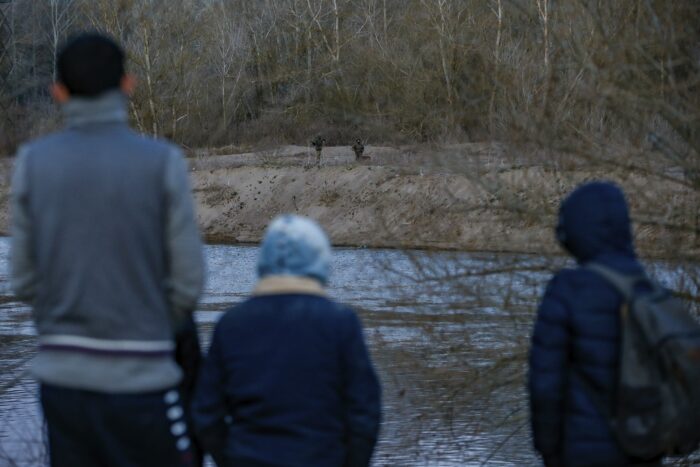»We need to collect evidence«
Activist Hope Barker on strategies against human rights violations at the EU's external borders
Interview: Ulrike Wagener

In January alone, 100 refugees died or went missing in the Mediterranean. That is twice as many as in the previous year. Hope Barker has been monitoring the European borders for a long time.
Why are more and more refugees dying on their way to Europe?
Hope Barker: The main reason is the complete lack of safe and legal routes. If people can’t migrate safely, they won’t stop migrating. Studies show that they simply take riskier routes and are more likely to die. Along the so-called Balkan route, refugees die from road accidents, suffocation and drowning in rivers. This would not happen if people could walk to a border crossing and ask for asylum there, knowing that their application would be assessed. European politicians want to put all the responsibility for the deaths on smuggling gangs, but smuggling gangs would not exist if there were safe and legal escape routes.
In December, the EU Parliament reached an agreement with the member states in the Common European Asylum System (CEAS). It envisages ›border procedures‹ in detention-like conditions, including for children, and an expansion of supposedly safe third countries. What will be the most serious change for refugees as soon as this pact is implemented?
My biggest concern is the legal fiction of non-entry. The majority of those seeking protection will first undergo a screening at the border and then a border procedure. If they arrive via a so-called safe third country, they will be deported immediately. And during this entire time, they are officially deemed not to have entered the EU and remain in a state of limbo. I think this will lead to mass detentions and mass deportations at the borders.
What rights will people still have?
EU politicians say that the member states are still bound by the EU Charter of Fundamental Rights. However, the Charter only applies to the territory of the member states. And there is nothing explicit about this in the draft law. There is therefore a risk that the fundamental rights of refugees will be further curtailed.

Hope Barker
is an activist for the rights of refugees. From 2019-2023, she worked as Senior Policy Analyst for the Border Violence Monitoring Network. She is currently doing independent research on border deaths and disappearances.
In your work for the Border Violence Monitoring Network (BVMN), you observed pushbacks along the Balkan route and collected witness reports. What was reported to you?
In general, a pattern can be recognised that is followed everywhere. If people are apprehended near the border, they are pushed back directly. If they are apprehended inland, they are often shunted back and forth between police stations and then brought back across the border in groups. In most cases, this is accompanied by a high level of violence, usually we are talking about punches, kicks, and the use of batons. But we also have cases where there were mock executions, forced undressings, the use of electric discharge weapons, people had their heads shaved or their heads sprayed with crosses in a kind of religious persecution. They are almost always stripped of all their personal possessions and money. Their clothes and belongings are often burnt. We see this at all of the EU’s external borders. When we started monitoring in 2017, it was Hungary that was carrying out pushbacks to Serbia. Then Hungary closed its borders and erected a fence. The route shifted to Croatia and a few months later we saw exactly the same tactics used there. So there is a common practice or a common learning, because how else could you recognise the same patterns at all the external borders of the EU?
These practices are all against the law. A European citizens‘ initiative is currently collecting signatures to persuade the EU to comply with Article 4, the ban on torture and inhumane treatment. But these practices are being done by the state. How successful can this initiative be?
This is definitely a violation of Article 4. We also produce reports on torture in which we categorise witness statements into different types of torture. But you have to realise that a pushback in and of itself is a violation of rights. The violence is an aggravating circumstance, but even if someone is pushed back without violence, it is still a violation of their rights. These initiatives are all super important! But for the last three or four years, it’s been known that these things are happening. When we started our work, we wanted to put the issue on the agenda. We thought that if we could get politicians to admit these pushbacks, it would have to stop. Today, everyone on a political level knows it’s happening, right up to the top of the EU. But they just don’t care. There is no political will to stop it.
You yourself have founded a small NGO that will remain anonymous. It distributes food to refugees in Thessaloniki.
Before the pandemic, Thessaloniki was a transit city for many refugees. There were 500 to 600 people here every day looking for food. But that changed with the pandemic. We were no longer allowed to run a community centre, so we went outside. During this time, the Greek police started carrying out mass arrests and raids. We later learnt that the people were being pushed back to Turkey. Before that, there were no pushbacks from Thessaloniki, the Turkish border is over 300 kilometres away, so people rested here before travelling on. As an NGO, we adapted to the Covid restrictions because we still had to take care of 100 to 200 people every day. We then published a report about these pushbacks with the name and logo of our NGO. And a week later, the police came and stormed the distribution centre. They arrested 39 people while they were literally queuing for food. They were also pushed back to Turkey. Since then, things have gotten worse. Last year we fed maybe 50 to 60 people a day, a third of them Greek homeless people. So either people pass through very quickly or they bypass Thessaloniki altogether.
What kind of repression have you experienced?
In the summer of 2022, I was more publicly recognised as the spokesperson for BVMN. At that time, we did a lot of work on the refugees who were stranded on a sand bank in the Evros River and who were not being helped by Greece or Turkey. One child was reported to have died from a scorpion bite. The Greek government labelled this as fake news. It became very intense at the time. Some of us were slandered in the media, there were arbitrary checks and searches, my partner was eventually arrested. He was only held for a short time, but it was clear that they were trying to get information. They took his phone, after that it stopped working properly. There were all these threats and in the end we decided to leave Greece because we felt too monitored and no longer safe.
There have been many demonstrations against the right in Germany since Correctiv reported on a meeting of right-wingers, including AfD and CDU politicians and members of the Identitarian movement, at which plans to deport non-white people, including citizens, were discussed. The Minister of the Interior praised the defence of ›freedom, justice and the values of the Federal Republic of Germany‹. At the same time, the government passed a deportation law with numerous restrictions on fundamental rights. Are there similar developments in Greece?
No, it’s different there. Southern EU countries such as Greece and Italy have been bearing the brunt of caring for incoming refugees for so long that the right wing is now openly in power. It’s easy to point the finger at the right wing because they say it very clearly that they want to deport all non-white people. In the northern European states and also in the EU Parliament, we have instead a ›centre-right‹ that is pursuing a very similar policy, they just dress it up in more flowery words. In the UK, we had a very left-wing candidate, Jeremy Corbyn, who was overwhelmingly defeated in the election. I think most people in Europe want a right-wing government at this point, they just don’t want to be seen as fascist.
We are currently on the road to right-wing fascism, the European elections will be terrible.
What would be a good strategy to counter this now?
As the left, we need to come together across borders and build a really strong movement. This requires alternative visions, it is not enough to just be against things, we need to promote a viable alternative. Personally, I am focussing more on long-term strategies. We are currently on the road to right-wing fascism, the European elections will be terrible. But things will change again. And I think when it does, there will be a lot of shame about how people were treated at the European borders. And hopefully there will be a trial in The Hague. For that we need to go to the borders, monitor them and continue to collect evidence so that nobody can ever say that this didn’t happen. It is important that historically there will be justice at some point.
That’s a very depressing prospect. Where do you get the motivation to keep going anyway?
For me, there is no other option. Once you really know what is happening at the external borders, you can no longer ignore it. I think the problem is that we are all so inundated with news. Refugees appear there as an anonymous mass of people, as a problem. That’s why we need to share the specific stories of the people we know and meet and make them human. If everyone tells another person about it, a collective consciousness will eventually emerge that we can no longer ignore.
